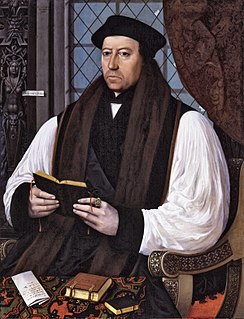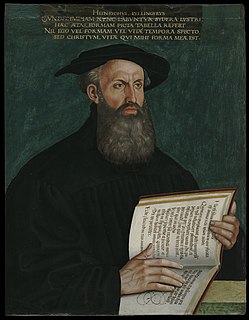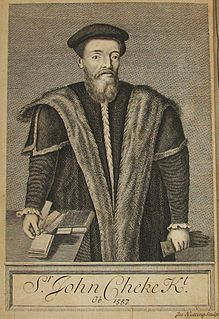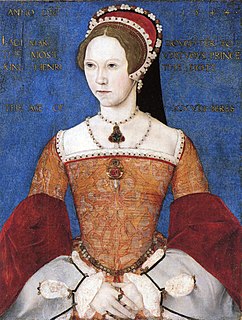
Edward VI was the King of England and Ireland from 28 January 1547 until his death in 1553. He was crowned on 20 February at the age of nine. Edward was the son of Henry VIII and Jane Seymour, and England's first monarch to be raised as a Protestant. During his reign, the realm was governed by a regency council because he never reached maturity. The council was first led by his uncle Edward Seymour, 1st Duke of Somerset (1547–1549), and then by John Dudley, 1st Earl of Warwick (1550–1553), who from 1551 was Duke of Northumberland.

Thomas Cranmer was a leader of the English Reformation and Archbishop of Canterbury during the reigns of Henry VIII, Edward VI and, for a short time, Mary I. He helped build the case for the annulment of Henry's marriage to Catherine of Aragon, which was one of the causes of the separation of the English Church from union with the Holy See. Along with Thomas Cromwell, he supported the principle of royal supremacy, in which the king was considered sovereign over the Church within his realm.

Myles Coverdale, first name also spelt Miles, was an English ecclesiastical reformer chiefly known as a Bible translator, preacher and, briefly, Bishop of Exeter (1551–1553). In 1535, Coverdale produced the first complete printed translation of the Bible into English. His theological development is a paradigm of the progress of the English Reformation from 1530 to 1552. By the time of his death, he had transitioned into an early Puritan, affiliated to Calvin, yet still advocating the teachings of Augustine.

Heinrich Bullinger was a Swiss reformer, the successor of Huldrych Zwingli as head of the Zürich church and pastor at Grossmünster. As one of the most important reformers in the Swiss reformation, Bullinger is known for co-authoring the Helvetic Confessions and his work with John Calvin on the Real Presence of Christ in the Eucharist.
This article presents lists of literary events and publications in the 16th century.

Nicholas Ridley was an English Bishop of London. Ridley was burned at the stake as one of the Oxford Martyrs during the Marian Persecutions for his teachings and his support of Lady Jane Grey. He is remembered with a commemoration in the calendar of saints in some parts of the Anglican Communion on 16 October.

Sir John Cheke (Cheek) was an English classical scholar and statesman. One of the foremost teachers of his age, and the first Regius Professor of Greek at the University of Cambridge, he played a great part in the revival of Greek learning in England. He was tutor to Prince Edward, the future King Edward VI, and also sometimes to Princess Elizabeth. Of strongly Reformist sympathy in religious affairs, his public career as Provost of King's College, Cambridge, Member of Parliament and briefly as Secretary of State during King Edward's reign was brought to a close by the accession of Queen Mary in 1553. He went into voluntary exile abroad, at first under royal licence. He was captured and imprisoned in 1556, and under threat or apprehension of execution by the fire made a forced public recantation and affiliated himself to the Church of Rome. He died not long afterwards, filled with remorse for having forsworn his true belief from the infirmity of fear. His character, teaching and reputation were, however, admiringly and honourably upheld.

John Hooper was an English churchman, Anglican Bishop of Gloucester, later of Worcester and Gloucester, a Protestant reformer and a Protestant martyr. A proponent of the English Reformation, he was executed for heresy by burning during the reign of Queen Mary I.

Andrew Boorde was an English traveller, physician and writer.
Robert Crowley, was a stationer, poet, polemicist and Protestant clergyman among Marian exiles at Frankfurt. He seems to have been a Henrician Evangelical in favour of a more reformed Protestantism than the king and the Church of England sanctioned. Under Edward VI, he joined a London network of evangelical stationers to argue for reforms, sharing a vision of his contemporaries Hugh Latimer, Thomas Lever, Thomas Beccon and others of England as a reformed Christian commonwealth. He attacked as inhibiting reform what he saw as corruption and uncharitable self-interest among the clergy and wealthy. Meanwhile, Crowley took part in making the first printed editions of Piers Plowman, the first translation of the Gospels into Welsh, and the first complete metrical psalter in English, which was also the first to include harmonised music. Towards the end of Edward's reign and later, Crowley criticised the Edwardian Reformation as compromised and saw the Dissolution of the Monasteries as replacing one form of corruption by another. On his return to England after the reign of Mary I, Crowley revised his chronicle to represent the Edwardian Reformation as a failure, due to figures like Thomas Seymour, 1st Baron Seymour of Sudeley, Edward Seymour, 1st Duke of Somerset and John Dudley, 1st Duke of Northumberland. Crowley's account of the Marian martyrs represented them as a cost mostly paid by commoners. The work became a source for John Foxe's account of the period in his Actes and Monuments. Crowley held church positions in the early to mid-1560s and sought change from the pulpit and within the church hierarchy. Against the Elizabethan Religious Settlement, Crowley was a leader in the renewed vestments controversy, which eventually lost him his clerical posts. During the dispute he and other London clergy produced a "first Puritan manifesto". Late in life Crowley was restored to several church posts and appears to have charted a more moderate course in defending it from Roman Catholicism and from nonconformist factions that espoused a Presbyterian church polity.
John Ponet, sometimes spelled John Poynet, was an English Protestant churchman and controversial writer, the bishop of Winchester and Marian exile. He is now best known as a resistance theorist who made a sustained attack on the divine right of kings.
Francisco de Enzinas, also known by the humanist name Francis Dryander, was a classical scholar, translator, author, Protestant reformer and apologist of Spanish origin.

A mess of pottage is something immediately attractive but of little value taken foolishly and carelessly in exchange for something more distant and perhaps less tangible but immensely more valuable. The phrase alludes to Esau's sale of his birthright for a meal ("mess") of lentil stew ("pottage") in Genesis 25:29–34 and connotes shortsightedness and misplaced priorities.
John Harpsfield (1516–1578) was an English Catholic controversialist and humanist.

John Young (1514–1580) was an English Catholic clergyman and academic. He was Master of Pembroke Hall, Cambridge, and was later imprisoned by Elizabeth I. He is not John Young (1534?–1605), Master of Pembroke Hall later in the century, and afterwards Bishop of Rochester.
William Chedsey (1510?-1574?) was an English Roman Catholic and academic, archdeacon of Middlesex in 1556 and President of Corpus Christi College, Oxford in 1558.
Antoine Rodolphe Chevallier (1523–1572) was a French Protestant Hebraist and a holder of teaching positions in England. He acted as tutor in French and Hebrew to the future Elizabeth I of England.
Lancelot Ridley, was an English clergyman, known as a theological writer, and rector of St James' Church, Stretham, Cambridgeshire.
John Véron was a French Protestant controversialist and preacher, known for his activities in England.

Miles Huggarde or Myles Hogarde, was an English religious pamphleteer and opponent of the Protestant Reformation. He has been described as the best of Roman Catholic propagandists in the bitter pamphlet war of 1553–1558 during the reign of Queen Mary I.
![]() This article incorporates text from a publication now in the public domain : Lee, Sidney, ed. (1893). "Lynne, Walter". Dictionary of National Biography . 34. London: Smith, Elder & Co.
This article incorporates text from a publication now in the public domain : Lee, Sidney, ed. (1893). "Lynne, Walter". Dictionary of National Biography . 34. London: Smith, Elder & Co.









